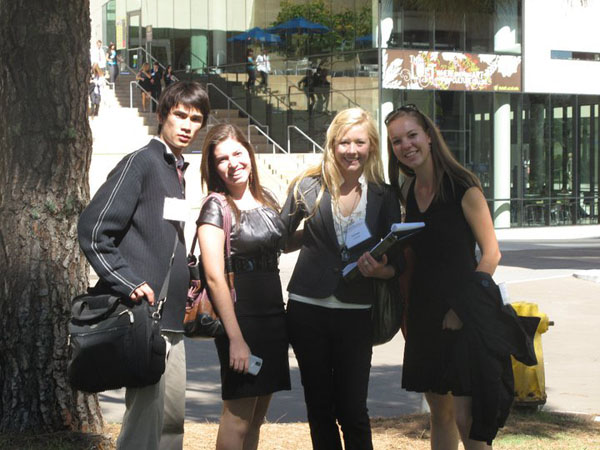As students begin to study for final exams this weekend, the members of the Model United Nations will be making an appearance at the High Tech High conference in Point Loma this Saturday to engage in a summit based on global issues and political banter.
Before the actual conference, MUN chapters from the participating schools are assigned countries and committees. Then, club leaders Anna Dornisch, Erin Wolkenstein, and Mallory Wahl divide the countries and committees among fellow club members. Committee and country combinations that will be discussed by CCHS MUN delegates include Switzerland and the World Health Organization (WHO), Egypt and UNICEF, and Switzerland and the International Court of Justice (ICJ). Committees can consist of either one or two delegates.
Then, within the committee, conference chairs assign specific issues to each delegate or delegate team – the chairs are either high school students from another MUN chapter or college students, depending on the location of the conference. Wolkenstein explained that prior to the conference, delegates submit position papers to the conference chairs via e-mail for review. In these papers, delegates usually discuss two topics, using statistics and past and present UN policies to support possible solutions for the issues they research.
Delegates are expected to look professional, and CCHS delegates wear business-attire – boys are required to wear dress pants, dress shirts, dress shoes, and a tie, and girls must wear either a dress or a skirt of appropriate length or dress pants. However, some students from other schools go to extremes by wearing clothing reflective of the country they are representing. “At one conference I went to, there was a delegate who was representing Ireland, dressed as a leprechaun,” said senior Mike Mezzino.
At bigger conferences, the day begins with “Opening Ceremonies,” where a guest speaker discusses a global issue. Then, during the actual conference, delegates give speeches and moderated or unmoderated debates take place among delegates in individual committees. “Some people there are very competitive and others aren’t. There are some really smart people who go that take it very, very seriously. Then there’s always the people that just have fun with it,” said Mezzino.
“We definitely take ourselves seriously, but at the same time, we like to have fun and spice up the conferences,” said Dornisch.
Fun at these conferences consists of word play, clever exchanges, and addressing delegates by the countries they represent. Staple MUN lingo includes “highly smiled upon,” “highly frowned upon,” and “dilatory.”
“During conferences delegates can make motions – usually the are used during debate to move from one subject to the next or to make additional points, but some of the sillier ones I’ve heard are ‘moments of silence’ for endangered whales from ‘Save the Whales Committee’ and a reversal-of-the-order speeches from the delegate next on the list,” said Wolkenstein.
Those who take it to the extreme give over-zealous speeches and start heated debates. As members of the Security Council during the October UCSD conference, Dornisch and Mezzino witnessed repeated confrontation between Russian and American delegates. “They were debating about the Cold War, and they were making up news stories containing allegations of belligerent behavior. The USA accused Russia of killing spies; of course it wasn’t real, but it’s always interesting to watch how far some people will go,” said Dornisch.
“In one conference when I was a sophomore, a delegate got really heated about this buffer zone in Israel and Pakistan; the entire committee was against him, but he gave four speeches that this buffer zone was the only solution to the fighting in Pakistan and Israel,” said Wahl.
Throughout the conference, countries who have similar views will band together, and at the end of the conference, a delegate is commissioned to write a resolution that all of the committee members vote on. The resolution either passes or fails, depending on the final vote count. Wahl said this phase of the conference is like Congress – in order to pass a resolution, all of the committee members must cast a ballot, and there must be a majority vote.
“At the last conference it had been determined that I was writing the resolution for our committee and everyone was going to vote for it. Then, all these small countries formed an alliance to keep my resolution from being passed. That day felt like a bad episode of Survivor,” said senior Devon Hillard.
Despite the somewhat competitive nature of these conferences, there are plenty of opportunities to meet friends. Wahl and Wolkenstein both agreed that because of the intimate nature of these conferences, it is relatively easy to make new friends, and both have been able to keep in touch with fellow delegates from other parts of the state and country.
The three clubs leaders stated that Model United Nations has further stimulated their interest in international relations and has given them broader knowledge of global issues and current events. “There are many practices, issues, and conflicts going on around the world that are never heard of because they don’t directly affect us. MUN is a great way to become aware of these issues and challenge myself to act like UN members to solve these problems,” said Wolkenstein.
“MUN has really influenced my global view. In high school, it is easy to become absorbed with just the immediate world around you, but MUN puts everything in perspective,” said Wahl.





















































